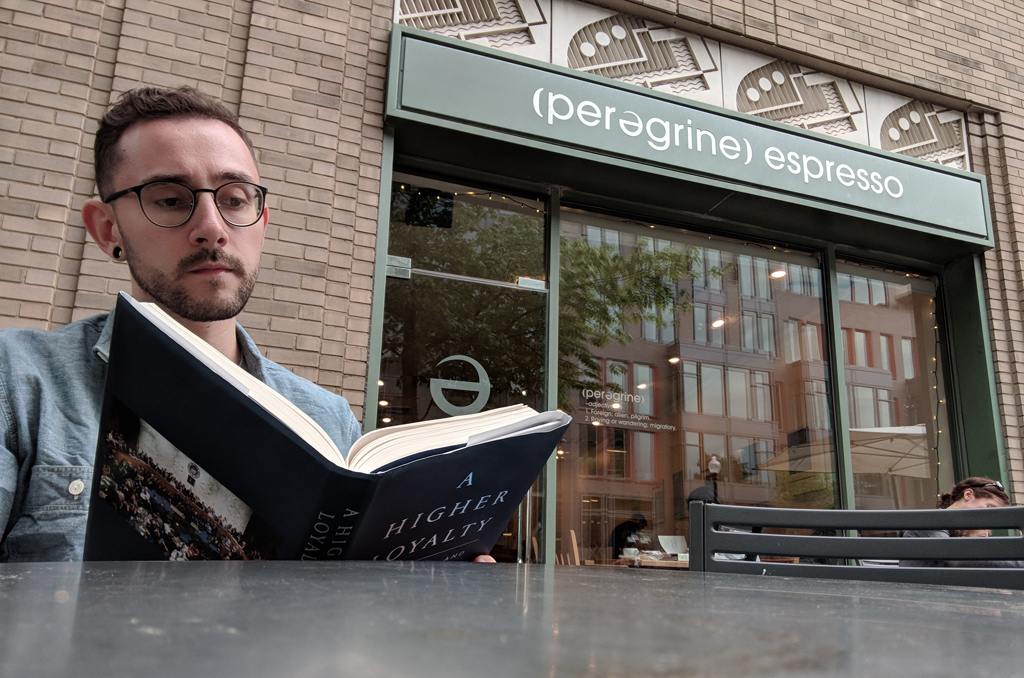Would someone please pinch Steven Forsyth?
He’s living out the first half of an incredible dream – working in Washington, D.C., for the biggest tech company you’ve never heard of and plotting out a future in AI, known to the rest of us as the field of artificial intelligence.
“It’s funny, but my undergraduate degree had nothing to do with AI. I went from studying black holes to artificial intelligence,” says Forsyth, who graduated from Valencia’s Seneff Honors College in May 2014 and transferred to Georgia Tech, where he graduated with a physics degree in May 2017.
It’s all part of Forsyth’s amazing college and post-college journey. Yet he could never have imagined it when he was a teenager growing up in south Florida.
“I didn’t do so well in high school. I didn’t care about grades or academia. I was a little unprepared for the real world,” says Forsyth, now 24.
Because he wanted to get out of Coral Springs, Fla., Forsyth followed his friends, many of whom were going to UCF or Valencia College in Orlando. So he signed up for classes at Valencia.
“Going to Valencia was probably the most pivotal decision for me in my life,” he says now. “I went from being a high school student who was not motivated, who didn’t really care about anything. Once I got to Valencia, my mindset flipped. I started caring about my grades and myself in general. I think Valencia played a major role in that.”
The key, he says, was being around other students more motivated than himself. “I escaped the normalcy of my daily life. I wasn’t taking classes with my friends. I was taking classes with other people. I started getting involved with Phi Theta Kappa… and they started dragging me into honors classes. They started to make me strive for me.”
Accepted to Phi Theta Kappa, the national honor society for community college students, Forsyth applied for, and was accepted into Valencia’s Seneff Honors College. He soon became fast friends with not only his fellow honors students, but honors advisers and professors, including Keith Malmos and Valerie Burks.
Forsyth is the first to say his life has been a series of amazing coincidences. “Starting at Valencia to now, things have unfolded in such a manner that it couldn’t have gone better,” he says. “Some of it was dumb luck, some of it was blind ambition and a large majority of it was guidance from all the fantastic mentors I’ve had along the way.”
In 2014, as he prepared to graduate from Valencia, he applied to a handful of universities, aiming for a good computer engineering program. On his list: University of Florida, UCF and MIT. When he discussed his options with Burks, then director of the honors college, she suggested Georgia Tech. “It’s actually funny. I had never heard of it before, but she subtly said, ‘If you don’t care how much it costs, Georgia Tech is a good school.’ So I applied on a whim.”
While at Georgia Tech, where he switched his major to physics, Forsyth occasionally suffered from “imposter syndrome,” the feeling that he didn’t belong there. But he reminded himself that the “geniuses” he was surrounded by had more opportunities and exposure to experiences and academics that he hadn’t. So he used that as motivation.
At Georgia Tech, this one-time underachiever served on a team of seven students (three undergraduates, two grad students and two post-doctoral students) that conducted research for LIGO, the Laser Interferometer Gravitational-Wave Observatory. Forsyth’s team focused on analyzing data from the LIGO detectors and figuring out the best way to extract the gravitational wave signals from the background noise. In 2017, LIGO won the Nobel Prize in physics for the first direct detection of gravitational waves.
Today, Forsyth is a “solution architect,” working for the tech company NVIDIA. Surrounded by people with their doctorates in “deep learning,” he’s the first undergraduate hired for the team. His job involves educating people and companies about deep learning and working as technical support to the sales team.
For now, Forsyth plans to work in the artificial intelligence industry for a few years, pay off his student loan debt and then head to graduate school. And one day, he plans to start his own business.
But for every C or D student out there wondering what they are doing with their lives, Forsyth has some advice.
“It’s the most cliché advice, but I have to say it because it worked for me. Get involved with your campus activities. Don’t just go to class and go home. Achieve and strive for more. Believe you’re worth more than you actually are. Stuff like that got me involved with people in the honors college,” he says. “I was a straight D kid in high school, but hanging around with them challenged me intellectually, they forced me to take harder classes than I would have taken. Challenge yourself to do more than you think you can do.”
